|
|
|
Sort Order |
|
|
|
Items / Page
|
|
|
|
|
|
|
| Srl | Item |
| 1 |
ID:
186313
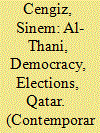

|
|
|
|
|
| Summary/Abstract |
Numerous studies have examined the decades-old Saudi-Iranian rivalry, which has played out in various regional arenas, notably Syria, Iraq, Yemen, Lebanon, and the Gulf. This article explores the place that Kurdistan Regional Government (KRG) in northern Iraq occupies within this rivalry. As the KRG’s foreign relations have attracted scholarly attention since the late 1990s, the article examines the Saudi Arabia–KRG relations in the post-2003 Iraq War, with a special focus on growing Iranian influence in Iraq. The end of Saddam Hussein’s rule and the subsequent rise of Shiite-dominated governments in Baghdad has shaken the regional balance, bringing out Iran as an influential actor in the Middle East. This laid the foundation for new understandings in the Saudi regional policy as Riyadh emphasized its relations with Iraq and the KRG, which became a crucial factor that can balance and imbalance power in the Middle East. It argues that common concerns for security and relative gains paved the way for a closer relationship between Riyadh and Erbil to counter threats emanating from both Iran and ISIS. Through case-specific information to those interested in Kurdish politics and the Middle East, it not only delves into the driving forces behind Riyadh-Erbil relations but also aims to present the Saudi interpretation of the 2017 Kurdish referendum.
|
|
|
|
|
|
|
|
|
|
|
|
|
|
|
|
| 2 |
ID:
170634
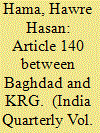

|
|
|
|
|
| Summary/Abstract |
The Iraqi state and the Kurds have always been at the odds over the territory around Kirkuk, particularly following the discovery of oil in the province in 1927. Both sides have claimed ownership of the province since that time and have sought to gain advantage over the other through various means. The region was subjected to a forced demographic change under the Arabisation policy during the reign of Ba’ath Party between 1968 and 2003. Following the overthrow of Saddam’s regime in 2003, the status of Kirkuk was to be constitutionally and peacefully resolved according to Article 58 of the 2004 interim constitution and then Article 140 of the 2005 permanent constitutions, which called for normalisation, a census, and a referendum in Kirkuk and other disputed areas to determine the will of their residents. Practically, however, various Iraqi governments and the two dominant Kurdish parties, the Patriotic Union of Kurdistan and the Kurdistan Democratic Party, were able to politicise implementation of Article 140. Although each blame the other, all share responsibility for the lack of implementation. This research investigates that experience and argues that the joint administration is the optimal scenario in the short run and independent region within the Iraqi state would be the best-case scenario in the long term.
|
|
|
|
|
|
|
|
|
|
|
|
|
|
|
|
| 3 |
ID:
075453


|
|
|
| 4 |
ID:
179797


|
|
|
|
|
| Summary/Abstract |
The Kurdish armed forces and security forces, known as the Peshmerga and Asayish, respectively, have both been intensively politicized by the Kurdistan Democratic Party and the Patriotic Union of Kurdistan from their foundation to the present. The Kurdistan Regional Government (KRG) has already experienced serious systematic crises caused by weak democratic institutions, poor governance, and a dysfunctional party system. The failure to build cohesive armed forces in the Kurdistan Region of Iraq exacerbates these issues because it politicizes basic internal and external security. This article, based on interviews with the Kurdish authorities, discusses the ramifications of the KRG’s politicized forces on the democratic process, civil-military relations, the defence readiness of the Kurdish armed forces, societal instability, and judicial power. This research argues that Kurdish politicized forces severely affect the democratic process in the Kurdistan Region, create problems for civil-military relations, undermine defence readiness, cause instability, and also have a considerable, negative impact on judicial power.
|
|
|
|
|
|
|
|
|
|
|
|
|
|
|
|
| 5 |
ID:
110318
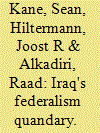

|
|
|
|
|
| Publication |
2012.
|
| Summary/Abstract |
WITH U.S. combat troops out of Iraq and that country facing an uncertain future, many challenges hover over the lands of old Mesopotamia. The most ominous is the unsettled struggle over power, territory and resources among the country's political elites. While often described in straightforward ethnic and sectarian terms, this strife has gone through many phases. Various alliances have come together and broken apart as the power struggle has shifted from a sectarian street war to heightened tensions between Baghdad and the Kurdistan Regional Government (KRG) in Erbil. Most recently, the main axis of confrontation has been between Prime Minister Nouri al-Maliki's Shia-led government and its putative governing partner, the mostly Sunni Iraqiya list.
|
|
|
|
|
|
|
|
|
|
|
|
|
|
|
|
| 6 |
ID:
129421
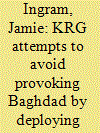

|
|
|
| 7 |
ID:
121769


|
|
|
|
|
| Publication |
2013.
|
| Summary/Abstract |
The purpose of this article is to survey the Kurdish Spring (demands for meaningful democracy along with cultural, social, and political rights and their immediate implementation) that has occurred in the aftermath of the much better known Arab Spring which began in late 2010. To this end it analyses the situation in Turkey, Iraq and Syria. In Turkey the failure of the government's much heralded Kurdish Opening and the prospects for its renewal are investigated. This includes the continuing kck arrests and sentencings that seem more a war on dissent than on terror. In Iraq the rise of the Gorran Party, anti-government demonstrations which occurred in 2011, and Kurdistan Regional Government (krg) president Massoud Barzani's recent hints that the krg will declare independence are discussed. The failure to agree on a hydrocarbons law and on a boundary for the krg are two major reasons for Barzani's position. For Syria the article analyses the assassination of Mishaal Tammo in October 2011 and the rise of the pkk-affiliated pyd against the background of Syria suddenly becoming a major factor in the Kurdish Spring. Iran's relative quiescence will also be noted.
|
|
|
|
|
|
|
|
|
|
|
|
|
|
|
|
| 8 |
ID:
159234
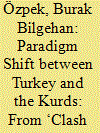

|
|
|
|
|
| Summary/Abstract |
Throughout the history of the Turkish Republic, its military and political elites in Ankara have regarded the Kurdish question as a security issue. Therefore, initiating the ‘peace process’ with the PKK and developing intimate relations with the Kurdistan Regional Government (KRG) have been regarded as deviations from the Turkish state’s traditional policy toward the Kurdish question. However, the optimism that the peace process generated gradually has disappeared as the Justice and Development Party (AKP) in Turkey and the Kurdistan Democratic Party (KDP) in the Kurdistan Regional Government have resorted to increasingly authoritarian policies. The declining democratization performance of the AKP and the KDP has deepened the internal divisions in both societies and bilateral relations between Turkey and the KRG have transformed into inter-governmental solidarity rather than institutional peace. Since the end of the ‘peace process’ following the June 7 national elections in 2015, the AKP has refused to deal with its country’s Kurdish actors, which, it says, are linked to the PKK and its ideology. Meanwhile, the AKP’s increasingly authoritarian policies have excluded non-AKP voters’ views from the policy-making process. Therefore, the cooperation between Turkey and the KRG has excluded half of the Turks and the Kurds at best. Consequently, the traditional ethnicity-based confrontation between the Turks and Kurds has been replaced, on the one hand, by an alignment among the AKP, the conservative Kurds of Turkey, the KDP and its allies in Northern Syria, and on the other hand, are the Peoples’ Democratic Party (HDP), the Patriotic Union of Kurdistan (PUK), Gorran, the Democratic Union Party (PYD) and some sections of the secular, middle class and Turks discontented with the AKP regime.
|
|
|
|
|
|
|
|
|
|
|
|
|
|
|
|
| 9 |
ID:
158828


|
|
|
| 10 |
ID:
147851
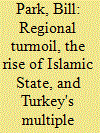

|
|
|
|
|
| Summary/Abstract |
This article traces the interrelationship of the roles played by Turkey and by various Kurdish non-state actors such as the Kurdistan Regional Government, the Kurdistan Workers Party, and the Democratic Union Party, in the current turmoil in Syria and Iraq. It considers their varying perspectives on Islamic State and other jihadi groups, the tensions between the region's Kurdish non-state actors, and the differences between them in their relationships with Turkey. The background to these differences is explored, as is their impact on relationships with other actors, most notably the US. The article concludes by noting that Turkey as a regionally powerful and coherent actor, and the Kurds as a distinct ethnic group with aspirations to self-determination, will continue to be powerful elements in the region's politics.
|
|
|
|
|
|
|
|
|
|
|
|
|
|
|
|
| 11 |
ID:
116113


|
|
|
|
|
| Publication |
2012.
|
| Summary/Abstract |
The mood in Erbil, Sulaymaniyah, and Dohuk -- the three largest cities in Iraqi Kurdistan -- is newly buoyant these days, and with good reason. Iraq's Kurds, who occupy the semiautonomous region run by the Kurdistan Regional Government (KRG), have much to celebrate. They enjoy relative peace and stability compared with the rest of the country, boast a moderately open society, and, over the past year, have received a whopping vote of confidence in their nascent economy from some of the world's largest oil companies, including ExxonMobil, Chevron, Total, and Gazprom, all of which have signed exploration contracts with the KRG. Not only is Iraqi Kurdistan undergoing an unprecedented building boom, but its people are now articulating a once-unthinkable notion: that the day they will break free from the rest of Iraq is nigh.
|
|
|
|
|
|
|
|
|
|
|
|
|
|
|
|
| 12 |
ID:
104265
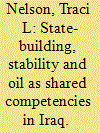

|
|
|
| 13 |
ID:
138612


|
|
|
|
|
| Summary/Abstract |
In the first weeks of October this year, an array of tanks waited on Turkey’s southern border, their commanders watching carefully as the Islamic State of Iraq and al-Sham (ISIS) fought to capture the nearby Syrian–Kurdish town of Kobane. The Democratic Union Party (PYD), the force defending the town and an offshoot of Turkish insurgent group the Kurdistan Workers’
Party (PKK), sought help from the powers allied against ISIS: the European Union, NATO, the United Nations, Turkey and, above all, the United States. But Ankara was reluctant to directly intervene in Kobane; it refused to allow help to reach the defenders and denied Washington permission to fly offensive operations out of the US Air Force base at Incirlik, in southern Turkey. Despite the threat that ISIS posed to the country further down the line, Ankara’s preference appeared to be for the town to fall, thereby dealing a heavy blow to the Syrian Kurds.
|
|
|
|
|
|
|
|
|
|
|
|
|
|
|
|
| 14 |
ID:
099902


|
|
|
|
|
| Publication |
2010.
|
| Summary/Abstract |
The disputed internal boundaries in northern Iraq between the Kurds and the Arabs have been a persistent fault-line in the state's history and have rapidly emerged as a core dispute since the 2003 invasion of Iraq. The Kurds underwrote, more than any other constituency, the democratic project in the new Iraq and contrived an ambitious constitutional route through Article 140 to place Kirkuk and other disputed areas under the administration of the Kurdistan Regional Government (KRG) by December 2007. Article 140 was designed to resolve the issue in the Kurds favour once and for all, to circumvent yet another tedious negotiation round with the Arabs and to quarantine the Kurdish project from regional interference, particularly Turkey. On all three counts the strategy failed. This is primarily because of the complexity of the issue but there is also evidence of internal Kurdish discord with the strategy concerning the restoration of Kirkuk governorate's boundaries. The years 2007-2008 were a watershed for Kurdish designs to incorporate Kirkuk through a constitutional process and since then the disputed boundaries question has been left in a state of suspended animation.
However, if a negotiating framework were to emerge the contours of a 'deal' have begun to crystallize and there is scope to move from management of the issue to resolution. Answers to the questions of when and how will depend on the shape of the complete package, the new government constellation and the extent that Turkey and Iran reveal themselves in the political marketplace.
|
|
|
|
|
|
|
|
|
|
|
|
|
|
|
|
|
|
|
|
|